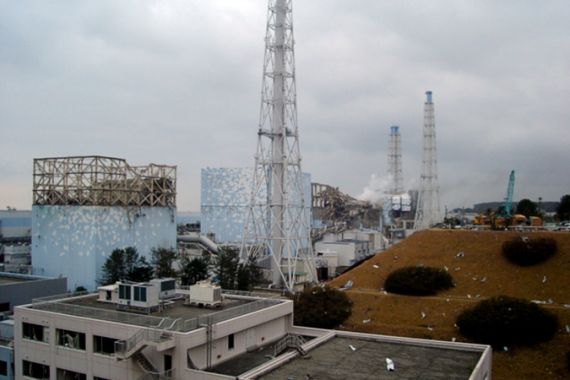Japan to release radioactive Fukushima water into the sea: Media
Any release of the water is expected to antagonise Japanese fishermen and raise concerns in neighbouring countries

Japan’s government has decided to release radioactive water from the devastated Fukushima nuclear plant into the sea, with a formal announcement expected to be made within this month, Kyodo news agency and other Japanese media reported on Friday.
Tokyo Electric Power Company has collected more than one million tonnes of contaminated water since the Fukushima Daiichi nuclear plant was crippled by the enormous earthquake and tsunami in March 2011.
Keep reading
list of 4 itemsBombs and viruses: The shadowy history of Israel’s attacks on Iranian soil
Russia says Ukraine attack hits Zaporizhzhia nuclear power plant
Nuclear energy cannot lead the global energy transition
Japanese Industry Minister Hiroshi Kajiyama said no decision had been made yet, but the government planned to make one quickly.
“Decommissioning of the Fukushima Daiichi plant is a major premise for a restoration in Fukushima from the nuclear disaster. To prevent any delays in the decommissioning process, we need to make a decision quickly,” he told a news conference.
He did not give any further details or a time-frame.
The build-up of contaminated water at Fukushima has been a sticking point in the clean-up, which is likely to last decades, especially as the delayed Olympic Games are due to be held in Tokyo next northern summer. Some events will take place less than 60 kilometres (35 miles) from the ruined plant.
Any release of the water is expected to antagonise Japanese fishermen and raise concerns in neighbouring countries.
Last week, Japanese fishing industry representatives urged the government not to allow the release of the water into the sea, saying it would undo years of work to restore their reputation.
South Korea has retained a ban on imports of seafood from the Fukushima region that was imposed after the nuclear disaster and summoned a senior Japanese embassy official last year to explain how the Fukushima water would be dealt with.
Early this year, a panel of experts advising Japan’s government on the disposal of radioactive water from the plant, recommended releasing it into the ocean.
Japan’s industry ministry has been hearing views from various parties since April, including fishery representatives.
A few fishery representatives also visited Kajiyama on Thursday and opposed the release of the contaminated water into the sea.